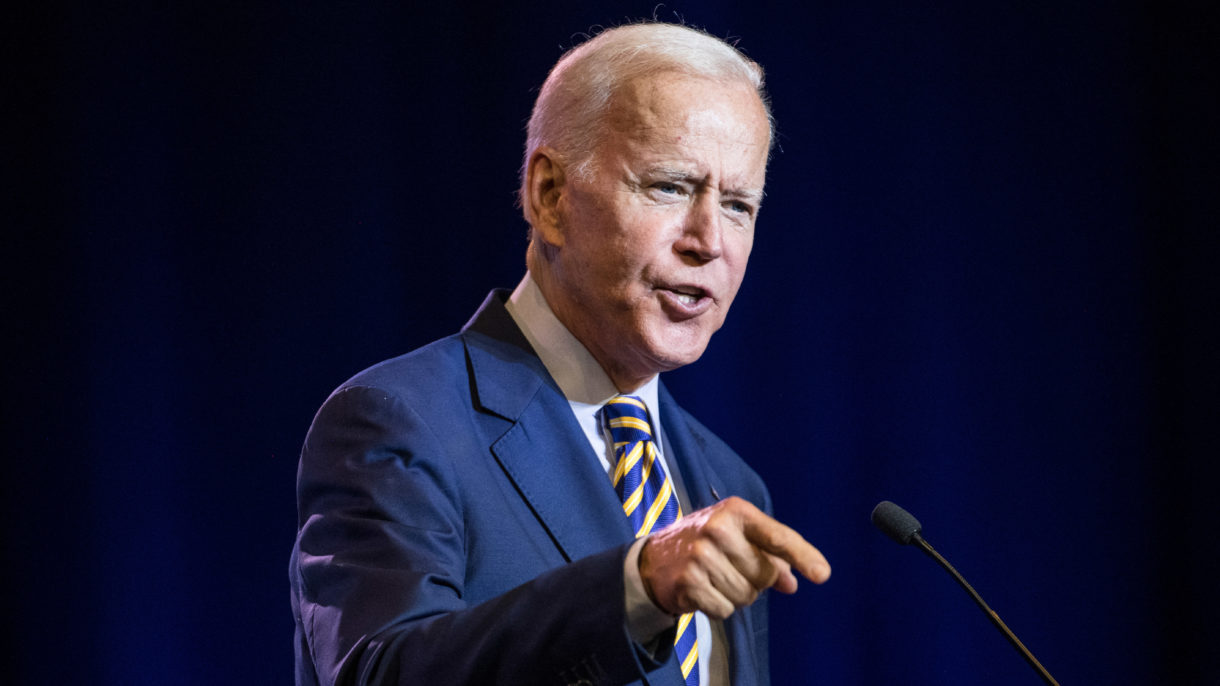Updated at 3:00 p.m. ET
President Trump has made undoing the Obama Administration’s foreign policy record one of his top priorities. So it’s no surprise that former Vice President Joe Biden — who played a key role in implementing now-abandoned agreements like the Paris climate agreement and the Iran nuclear deal, sees Trump’s foreign policy as a disaster.
In a major speech delivered Thursday afternoon in New York City, Biden warned that Trump “undermines our democratic alliances while embracing dictators who appeal to his vanity. And make no mistake about it. The world sees Trump for what he is: insincere, ill-informed, and impulsive. Sometimes corrupt. Dangerously incompetent, and incapable, in my view, of world leadership and leadership at home.”
Ahead of the speech, the former vice president’s campaign released an online video making a similar argument. The video begins with the image of the United Nations General Assembly laughing at President Trump during a speech to the body.
Biden went on to paint a stark picture of an increasingly unstable world, made more unstable by the Trump administration’s “America First” approach to foreign policy.
“Trust in institutions around the world is down, and fear of the other is way up,” Biden said. “Together, in my view, these forces have driven dangerous resurgences of extreme nationalism and illiberalism. Of protectionism and xenophobia. And Donald Trump and demagogues around the world are leaning into these forces.”
The crux of Biden’s foreign policy agenda is rebuilding the global alliances Trump has neglected or undermined and using those coalitions to push back against authoritarianism, climate change, and other threats.
Some of the specifics Biden hit on in the broad speech: rejoining the Paris climate accord, “empowering negotiators” to continue talks aimed at removing North Korea’s nuclear weapons capacities, and reengaging in diplomatic talks with Iran in an attempt to salvage the Obama Administration’s nuclear deal.
Iran recently broached the uranium-enrichment limit set by the 2015 deal, which the Trump administration had walked away from. But Biden said, “If Tehran returns to compliance with the deal, I would rejoin the agreement and work with our allies to strengthen and extend it, while more effectively pushing back against Iran’s destabilizing activities.”
Biden also pledged to end the “forever wars” in Afghanistan, Iraq, and elsewhere, and instead focus more specifically on combating terrorism. This was one of the Obama Administration’s main goals, and a focus of Obama’s 2008 presidential campaign. He removed U.S. combat troops from Iraq, which critics blame as a condition that allowed for the rise of ISIS, and 10 years after Obama took office, U.S. troops are still in Afghanistan.
When Biden last ran for president in 2008, foreign policy dominated the political discussion. The Iraq War – which Biden initially voted for but quickly opposed — was the main issue in the Democratic primary, with Iran, Afghanistan and several other global hot spots in the mix, as well. Biden did not address his Iraq War vote on Thursday, something that remains a source of criticism from his rivals.
In his speech, Biden promised to convene a “global summit for democracies” in the first year of his administration. The gathering would focus on confronting authoritarianism and restoring trust in institutions, and Biden said participating countries would need to make concrete pledges to combat corruption and improve human rights within their own borders.
Other policies Biden said would amount to a “day one down payment” on restoring American values: “We believe in freedom of religion. That’s why we’ll end the Muslim ban [the Trump administration’s controversial ban on travel from several Muslim-majority countries, which was upheld by the U.S. Supreme Court]. We believe in free speech. That’s why I’ll end the global gag rule that prevents money from getting to NGOs that even talk about family planning. We believe in the power of e free press. That’s why I’ll return immediately to daily briefings in the White House, the State Department, and the Defense Department.”
The Biden foreign policy platform encapsulates a main theme of the former vice president’s campaign: restoring the things the Trump Administration has spent the past two-and-a-half years ripping up. But it also crystallizes the way the political dynamics at home and abroad have shifted since Biden left office.
That suited the chairman of the Senate Foreign Relations Committee just fine, and although Biden dropped out of the 2008 race after Iowa, his reputation as an experienced, steady foreign policy hand helped put him on the Democratic ticket with Barack Obama.
In 2019, foreign policy is barely a blip on the campaign radar. Democratic voters are worried about issues like health care, income inequality, climate change, and above all else, the political challenge of defeating Trump. So it was notable that one of the very first things Biden said Thursday was, “In 2019, foreign policy is domestic policy, in my view. And domestic policy is foreign policy. They’re deeply connected.”
“The first pillar of the foreign policy is to repair and reinvigorate our own democracy,” a Biden campaign senior official said before Biden’s speech. “It goes to some very basic things including everything from remaking our education system to getting greater transparency in our political system.” The official went on to list economic reforms, and policies aimed at boosting the middle class.
That mirrors the way other leading Democratic candidates have framed their foreign policy platforms: as extensions of the economic reforms they’ve built their own political brands on.
“We need to end the fiction that our domestic and our foreign policy are somehow separate from each other, and recognize that policies that undermine working families in this country also erode America’s strength in the world,” Massachusetts Sen. Elizabeth Warren said last fall.
9(MDEwNzczMDA2MDEzNTg3ODA1MTAzZjYxNg004))
